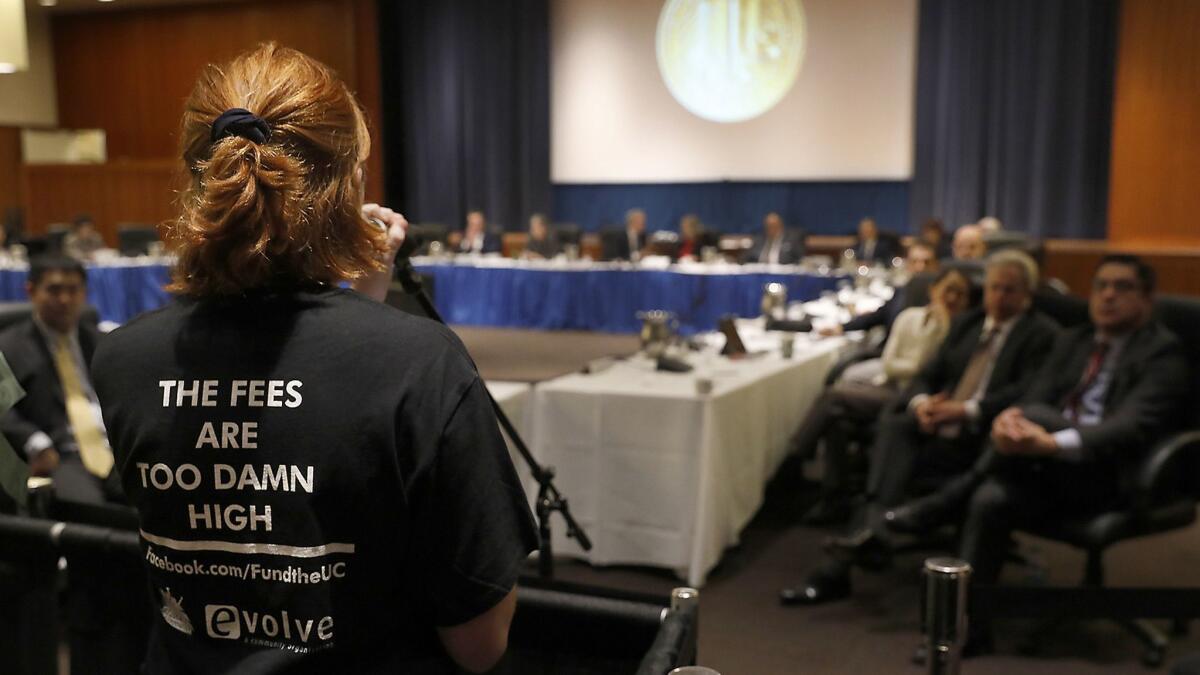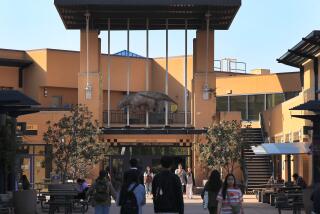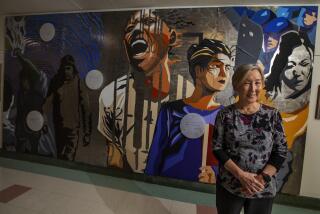Faculty diversity, Native American remains among the issues UC regents will take up this week

University of California regents will gather this week to discuss faculty diversity, policies on Native American remains and artifacts and the ongoing effort to add more California students without further squeezing those already enrolled.
At their two-day meeting, which starts Wednesday at UCLA, regents plan to discuss how to significantly increase the number of graduates to help meet the state’s projected need for 1.1 million more workers with four-year college degrees by 2030.
UC expects to continue adding students to the 10-campus system, which already has upped the number of California undergraduates by more than 15,000 since 2014-15. But the university also will need to find ways to get them to graduate more quickly and hire more faculty in order to help the state meet its workforce needs, according to a UC report.
Students are pushing for a 10% reduction in tuition or an equivalent increase in financial aid. They also want the university system to spend more on mental health services, academic advising and support for immigrant, low-income and underrepresented minority students. The UC meanwhile has a host of pressing needs, including more student housing and classroom space, technology upgrades, building repairs and a way to manage the rising costs of retiree benefits.
All of it will take more permanent state funding, say UC supporters, who are hopeful the next California governor will be more generous than Gov. Jerry Brown. Lt. Gov. Gavin Newsom, the front-running gubernatorial candidate and an ex-officio regent, has signaled support for more state funding by opposing tuition increases in the last two years.
To try to manage the competing demands with more stability and predictability, regents will start shaping a multiyear budget and enrollment plan. They plan to share the plan’s broad outlines in November.
“It’s balancing the desire for increasing enrollment with the need to properly take care of the students we have,” said board Chairman George Kieffer. “That’s a major issue for the coming year.”
Regents also will review the university’s progress in diversifying faculty, who are disproportionately male and white compared to students. Women make up about one-third of tenured or tenure-track faculty but more than half of undergraduates; underrepresented minorities make up one-tenth of such faculty and more than a quarter of undergraduates.
Recent hires are more diverse, according to an annual report presented to the regents, but it is likely to take time for faculty demographics to come close to mirroring those of students, in part because job turnover is low. The average professor serves 30 years before retiring.
The state has helped accelerate the progress with $6 million in funding since 2016 to support the recruitment of faculty who have promoted diversity. Postdoctoral fellowships offered by the office of UC President Janet Napolitano and campus chancellors — about 70 a year — have widened the pipeline of diverse candidates for faculty positions. This year, more than two-thirds of the president’s fellows are women and more than three-fourths are underrepresented minorities. UC also now requires faculty job applicants to explain how they’ve contributed to diversity in past teaching, research and service.
Such combined strategies have helped UC Riverside and UC San Diego in particular make their engineering faculty more diverse, the report said.
The regents also plan to clarify university policies for handling Native American human remains and cultural artifacts. Six campuses currently house them — acquired through archeological digs, transfers from coroner’s offices and donations — but sometimes clash with tribes over where they should be used and kept.
Some tribes have accused UC of stalling in repatriating remains or placing undue weight on their educational and research potential in decisions over whether they need to be returned.
UC says it does not consider potential educational or research potential in determining whether a tribe has a right to the remains or artifacts under federal and state laws.
Twitter: @TeresaWatanabe
More to Read
Start your day right
Sign up for Essential California for news, features and recommendations from the L.A. Times and beyond in your inbox six days a week.
You may occasionally receive promotional content from the Los Angeles Times.







